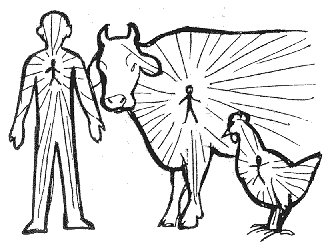Elementary: Kindness & Compassion
How many times throughout childhood do we question the food we eat? A pet rabbit pet or rabbit stew? An easter chick or chicken fried, billy goat rough or curried goat, playful kid or ‘succulent’ lamb chops and the list goes on. But for many people, the realisation that their favorite animal friends are killed and served as dinner has been enough to inspire their decision to abstain from meat and often all animal products. Unfortunately, many of the concerns that children have about the animal food relationship are ‘swept under the carpet’ by naive parents and adults who themselves have become desensitised to animal suffering accepting butchery as the norm. Our ideas about animals are further distorted ‘thanks’ to the animal production industry which spawn out multiple and constant advertisement campaigns which help sustain and reproduce our simplistic beliefs about them and their worth. Of course religion is another source of justification for our use and abuse of animals although we argue that true religion enshrines the sanctity of life, as do children if it weren’t for the cyclone of misinformation which in turn twarts our moral and psychological growth.
- By nature children are compassionate and generally more in touch with their raw elementy instincts of kindness and compassion. To feed them food or exhibit behaviour that runs contrary to this is upsetting and would generally result in their rejection of eating their animal brethren, if it weren’t for the above.
- And as parents, we have a vested interest in the food we have purchased and prepared. In many cases, we feel that we cannot afford to waste the food we have provided, especially the meat, which usually costs more than veg which can be grown.
- Many parents have been led to believe that animal products are necessary for good health, this type of information is largely disseminated by the meat and dairy industries and has its origins in outdated science. Even much of today’s science will warn of some of the health risks associated with consuming animals and their products.
 Of course, as young children we have little or no power to question the ‘friend/food’ contradictions or reject the food we are served. Truths are often concealed or played down resulting in the suppression of our most basic and natural thoughts and feelings. How might we measure the impact this has on the individual and on the world as a whole?
Of course, as young children we have little or no power to question the ‘friend/food’ contradictions or reject the food we are served. Truths are often concealed or played down resulting in the suppression of our most basic and natural thoughts and feelings. How might we measure the impact this has on the individual and on the world as a whole?
What would be the benefits nurturing our children’s most basic and natural emotions? One thing for sure, is that there would be a lot less suffering in the world. Sometimes women/mothers choose to nurture their children’s heightened awareness and may also resonate with the suffering endured by animals via the history of inequality & subjugation of women. Hence some mothers honour their children and animals.

